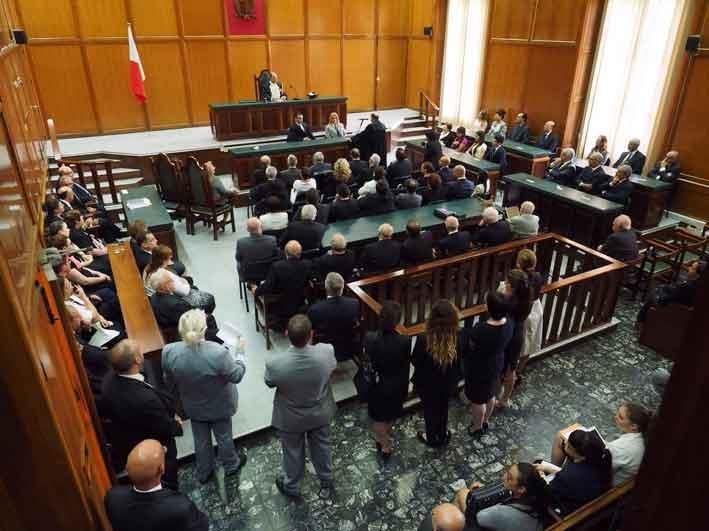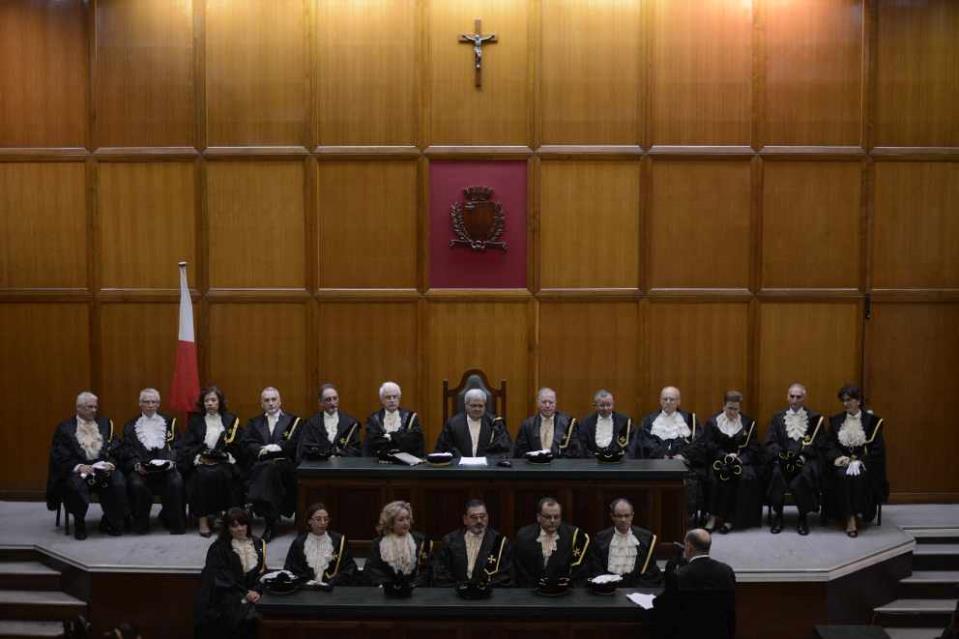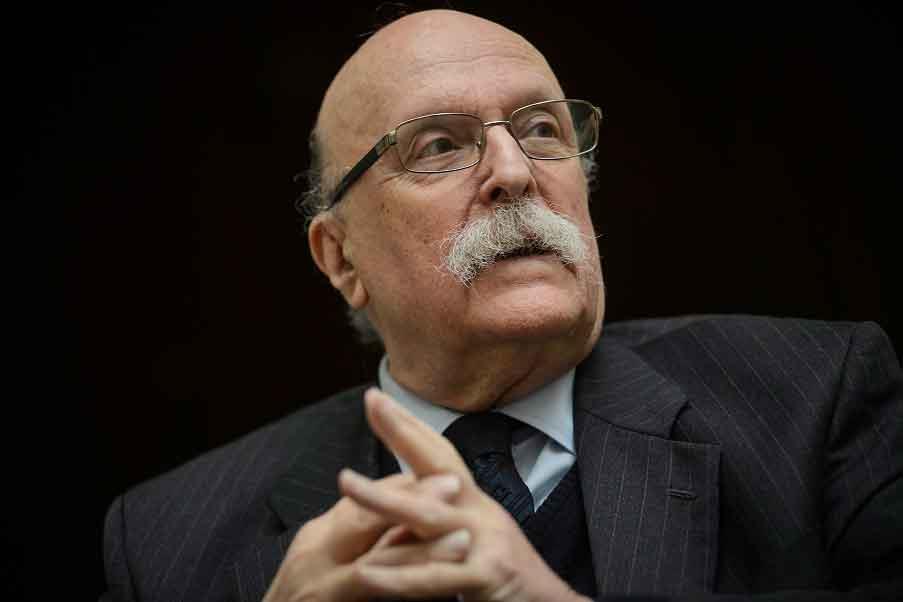When will you turn the judiciary into the official third pillar of state without any ties to government?
If this refers to the autonomy and independence of the judiciary, then this already exists. We are examined by various institutions – the European Commission, World Bank, the World Economic Forum – and they all say we have a healthy separation of powers. If your question deals with the appointment of the judiciary, then we need to strike a balance. Our system has served us well in the past and gave us excellent members of the judiciary over the years.
I believe the time is right to put forward a solution, whereby the government would still exercise a decision as to who will be appointed, but this decision would be backed by recommendations from a select team of experts. At the end of the day, the government is elected by the people, and there are elections every five years so if a government doesn’t deliver, it won’t be re-elected. This means that accountability exists on government’s part.
I don’t think that giving this task to an autonomous executive authority would be the best solution, and to be fair I don’t think anyone is proposing this. The Bonello report, the Chamber of Advocates and the Opposition are in favour of an advisory authority and I believe this will strike a healthy balance.

The Chamber of Advocates did raise concerns however, that the Prime Minister, according to the Bill, is not bound to the committee’s (a sub-committee of the Commission for the Administration of Justice (CAJ) that receives and evaluates expressions of interest in judicial posts and can also be asked to give its opinion on other judicial appointments) recommendations regarding the appointment of the judiciary. Why not listen to them?
We’re listening. When we issued the Bill, I said from the start that we will listen and that nothing is written in stone. I’m aware that this is a delicate subject and I am aware that we need to be sure on every minute detail of this Bill. The Chamber is suggesting an advisory authority to advise the government on appointments, and that government must take this advice – and if it doesn’t government would be free to do so however it must declare that it acted not according to the authority’s advice.
I saw the words “exceptional circumstances” in a press release, and I believe what they meant was, that if there is an important lawyer who would like to serve his country and form part of the judiciary but the committee does not agree, there must be some form of residual authority to allow the government to appoint that person even if the government wasn’t advised to do so.
I frankly believe there should be no problem on this issue but I will discuss it with my colleagues and if need be, fine tune the Bill.

Are there plans in the future to appoint Chief Justices only from members of the bench?
This idea has also been touted by members of the judiciary. As the law stands today, a lawyer from a private practice as well as the Attorney General could be appointed Chief Justice, and in fact my predecessor did just that, as the current Chief Justice was an Attorney General. While this view was aired, I don’t think they feel very strongly about this point, and I think that there are mixed views. I also believe that this point must be taken into consideration.
What conditions would you lay down to attract top-end candidates from the legal profession?
One very practical thing is ameliorating the pension of members of the judiciary. I believe they have accepted to serve their country not for the wage or their pensions, but having an adequate pension helps. A lawyer with a brilliant career might feel more comfortable joining the judiciary if he knows that at the end of his term, he would get a service pension.
I believe this is one way of attracting top-end candidates, but there are also other ways. Another such method would be improving the non-pecuniary aspect of the job and we are doing our best to do that.

What was the judiciary’s reaction to the disciplinary provisions?
They were in favour of increasing accountability. They were concerned, however, with the length of disciplinary proceedings. They said – ‘we don’t want a situation where a magistrate or a judge facing disciplinary proceedings before the Committee takes years to conclude’. In fact the Bill states that a case must end within one year. A second issue was whether the Committee for the Administration of Justice should be the one who appoints three people within its fold to serve on the disciplinary committee.
The CAJ is formed of five members of the judiciary, five non-members, and the President of Malta who only has a casting vote. The judiciary is fine with that but would recommended fine-tuning this aspect; the judiciary would vote two sets of members for the Committee, one for the discipline of judges and another for magistrates. The idea is that in the case of an appeal there would be no need to substitute CAJ members who were chosen to act in the disciplinary committee, so it would be easier from a practical point of view.
This isn’t the first time this has been brought up. Professor Kevin Aquilina mentioned this and the Bonello Commission stated that a magistrate and a judge should handle disciplinary proceedings.
The Bonello report recommended having a judge, a magistrate and a lay person sitting on the committee.
I’m not sure this is a good idea especially if it is a judge facing disciplinary proceedings. Does it make sense for a magistrate to discipline a judge?

Wouldn’t this effectively happen if its members are in the CAJ?
No, as the original proposal is such that it gives them enough flexibility to appoint three persons according to the scenario. So in the case of a judge, they could appoint three judges. I wanted to go for full flexibility as the CAJ has my full trust.
What would happen if a case before the disciplinary committee takes longer than the one-year time limit?
This was a question which was asked, and we discussed what the consequences could be but I think it requires further reflection. One obvious situation would see a judge or magistrate undergoing these proceedings be able to file a constitutional case claiming the Committee breached the Constitution. I’m sure that the Committee will take the one-year period very seriously. What I don’t want to see, are members of the judiciary spending six, seven, eight years in front of the CAJ; that is completely unacceptable.

You’ve had the Bonello report since 2013. Why did you go ahead with two controversial magisterial nominations, where the CAJ found one that was possibly unconstitutional, rather than going ahead with this bill in the first place?
In my opinion, the number one priority is tackling the length of proceedings. Since receiving the Bonello report, we have acted on measures to reduce the length of time it takes for a case to be decided. The Court Attorney system is one example. They assist judges on 140 judgements each month. A judge would normally hand out 120 judgements a year. We have also put forward amendments to the civil procedure which will expedite proceedings.
The EU Commission said last week that it is taking less time for a case to be decided now. That doesn’t mean that institutional issues aren’t important. We pledged to implement them by the end of the legislature and we will keep that promise.
I don’t know if I was expected to put everything on hold until the constitutional amendment goes through, but I don’t think it’s feasible to freeze new judicial appointments until these legal proceedings and the consultation process end. I had to strike a balance between starting a change and reducing the length of time cases take before concluding.

According to previous statements you made, Dr Caroline Farrugia Frendo was nominated for the post of magistrate before she passed the required eligibility period by law. Why did you nominate her at a time when she wasn’t eligible? Aren’t there other qualified lawyers?
Yes of course. I believe there is a lacuna which needs to be filled –that of having too few female members of the judiciary. We of course have female members of the judiciary who are doing a very good job. Madam Justice Edwina Grima made history last week by being the first woman to preside over a trial by Jury. She was promoted this legislature using the same methods; however the numbers were still too little. We made an effort to increase the number of woman from 35 per cent and now they’ve gone up to 43 per cent.
There are other lawyers who certainly fit the bill and tick the right boxes. In my opinion Dr Caroline Farrugia Frendo had two points that for me were very important. Firstly, she worked in a very busy law firm. I think Dr Anglu Farrugia’s law firm is one of the busiest, so she had on-the-ground experience. She was then appointed to the post of court attorney by the judiciary, so the judges believe her good enough to be a court attorney. I believe she would make a very good Magistrate.
But I’m sure there are a number of female lawyers who work in very busy law firms…
Yes of course, and if there are people who would like to form part of the judiciary I would be humbled if they came forward and showed their interest. We need more people to join the judiciary.

As for Dr Ingrid Zammit Young, why wasn’t her role as chairperson of the Employment Commission flagged, what went wrong?
Ingrid Zammit Young is an experienced lawyer coming from a commercial company. We need to have people with a commercial background. She was appointed to the Employment Commission on the agreement of both the Prime Minister and the Leader of the Opposition. So Dr Simon Busuttil favoured her nomination as chairperson of the Employment Commission. I saw a female lawyer with great experience with a commercial background and who had the support of both parties, so she ticked all the right boxes.
I was then made aware of this legal interpretation issue and I was told by a member of the civil service that there is a precedent where Dr Joseph Said Pullicino, who was chairman of the Broadcasting Authority, and as Chairman had the same impediment to serve in public office, was appointed Ombudsman immediately after his Broadcasting Authority term ended. I think the previous government’s interpretation was correct. I agree with that interpretation and I’m sure you agree that the Ombudsman is a public office, so I said there was a precedent and there shouldn’t be a problem.
When the Opposition flagged its concerns I didn’t take any risks and went to the Commission, which said there is a possibility of a Constitutional Breach, and she withdrew her nomination.
If you knew about the possible unconstitutional aspect of the issue, why did you allow her nomination to reach that stage?
I’m aware, and with hindsight, that under those circumstances there are questions as to whether I should have gone to the Commission before and not after. But I said why I took this decision and when looking at all the circumstances, I still believe Dr Zammit Young ticks all the right boxes to serve as magistrate. Unfortunately, things developed the way they did.